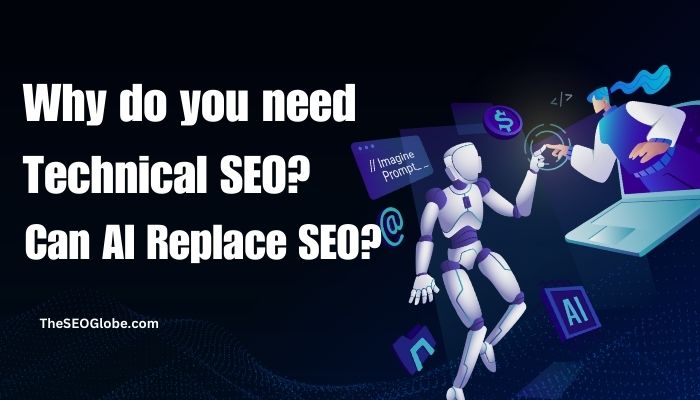Know all about why you need technical SEO, and how it can benefit your website and drive traffic. Also, learn if AI can bring revolution to the SEO business. Being as smart as it can be, is AI going to be a revolution in SEO too?
 Will AI hold the power to make SEO outdated? The quick response is no. Maybe a better question to ask is: Will AI eventually replace your job, or could it make human SEO analysis and actions unnecessary? According to preliminary research, AI is still lacking especially in technical SEO analysis.
Will AI hold the power to make SEO outdated? The quick response is no. Maybe a better question to ask is: Will AI eventually replace your job, or could it make human SEO analysis and actions unnecessary? According to preliminary research, AI is still lacking especially in technical SEO analysis.
Although simple prompts were the main focus of this study. However, some users claim that more intricate prompt creation produced better outcomes. This brings up an intriguing point: If AI were to take your place as an SEO manager a generalist would have to learn sophisticated prompt-crafting techniques which might eliminate the need for specialized analysts.
For the time being at least it doesn’t seem likely that your manager could simply replace you with AI. With specific prompts, AI can do technical SEO analysis however technical analysts like you benefit from the expertise needed to create such prompts.
You may be in a better position to take advantage of AI for your own gain which could mean fewer managerial positions being required. Don’t rejoice too soon though as AI develops and takes in more data so this benefit might only last temporarily.
Why does AI need professional knowledge of technical SEO?
AI seeks to do away with the necessity for semi-technical knowledge. In instances where data is typically highly organized (e.g. writing a Python script), artificial intelligence has an edge. However, the technical knowledge of a human operator is still required even in that case.
Even though artificial intelligence (AI) can write a script to complete a task the result won’t be useful without thorough instructions and human error corrections. At the moment, generative AI fills this vacuum by creating functional systems in response to precise instructions.
Technical people are best positioned to take advantage of AI’s full potential because it still thinks like machines. When it comes to AI-assisted on-page SEO tasks like mass-producing alt text or product descriptions technical knowledge is still necessary. Also, it requires the use of programs like Microsoft Excel to generate thousands of prompts. Even when you are familiar with OpenAIs API.
For artificial intelligence to work properly it requires human instructions. Additionally, the quality of these instructions is essential to producing high-quality results. The secret to successful AI-generated results is to think like a machine (using ID’s classes and distinct entities). For technical workers artificial intelligence (AI) increases productivity so it’s critical to accept rather than reject it.
Though creating these instructions is a crucial skill, generative AI still needs human input to produce anything (such as analysis text or images). When utilizing AI to increase efficiency employers should take into account the technical proficiency of their staff.
Why does AI perform poorly on SEO tasks?
AI’s strengths and weaknesses lie in data. For example, the performance of GPT-4 which employs a curated data model has been superior to that of Google Gemini and OpenAIs GPT-4o which can access massive amounts of web data. A fundamental tenet of machine learning was that increasing the amount of data available to AI would enhance its performance.
That being said this is also how we conceptualized simple algorithms which generate output based only on information. Google for instance has recently made an effort to minimize the significance of PageRank. In spite of the ideological validity of this, Google continues to use this kind of data to determine search results. Likewise, even when human subjectivity is translated into numerical data AI finds it difficult to process and frequently yields unexpected outcomes.
The open web contains both objective facts and subjective opinions which begs the question: Is more information always better for AI?
Artificial intelligence finds it difficult to discern between reality and fiction. Inaccuracies have increased recently when AI is given access to unsorted data. AI developer’s next task is to determine the ideal data input window.
To what extent does data benefit AI and what level of curation is required? Is AI limited? Are we safe?
Although this argument contains some false information it also contains some truth. Artificial intelligence (AI) has its limitations just like any other technology. Only human input can make generative AI act. Even if this isn’t the case now it might be in the near future as AI finds it difficult to tell reality from fiction. As far as commercial viability goes, some algorithms have served their purpose. One could argue that this is the reason Google is attempting to persuade us that links are unnecessary before they really are.
AI can be thought of as the progression of algorithmic results. These days these technologies are able to try to draw conclusions analytically from the data they receive. Still, there are serious obstacles to overcome before the notion that simply providing AI with an endless supply of data can lead to success. Technical analysts are not safe as a result of this. The desire for faster insights will not go away in human history. At first, artificial intelligence will be viewed as the solution.
Another AI can criticize the outcomes of the first one if it fails. But AI needs a lot of processing power. The real difficulty will lie in striking a balance between AI and more straightforward algorithms. While AI should be used for analysis and insights algorithms should be used for basic tasks. It will take several years if not decades to achieve this harmony between artificial intelligence and algorithmic efficiency.

